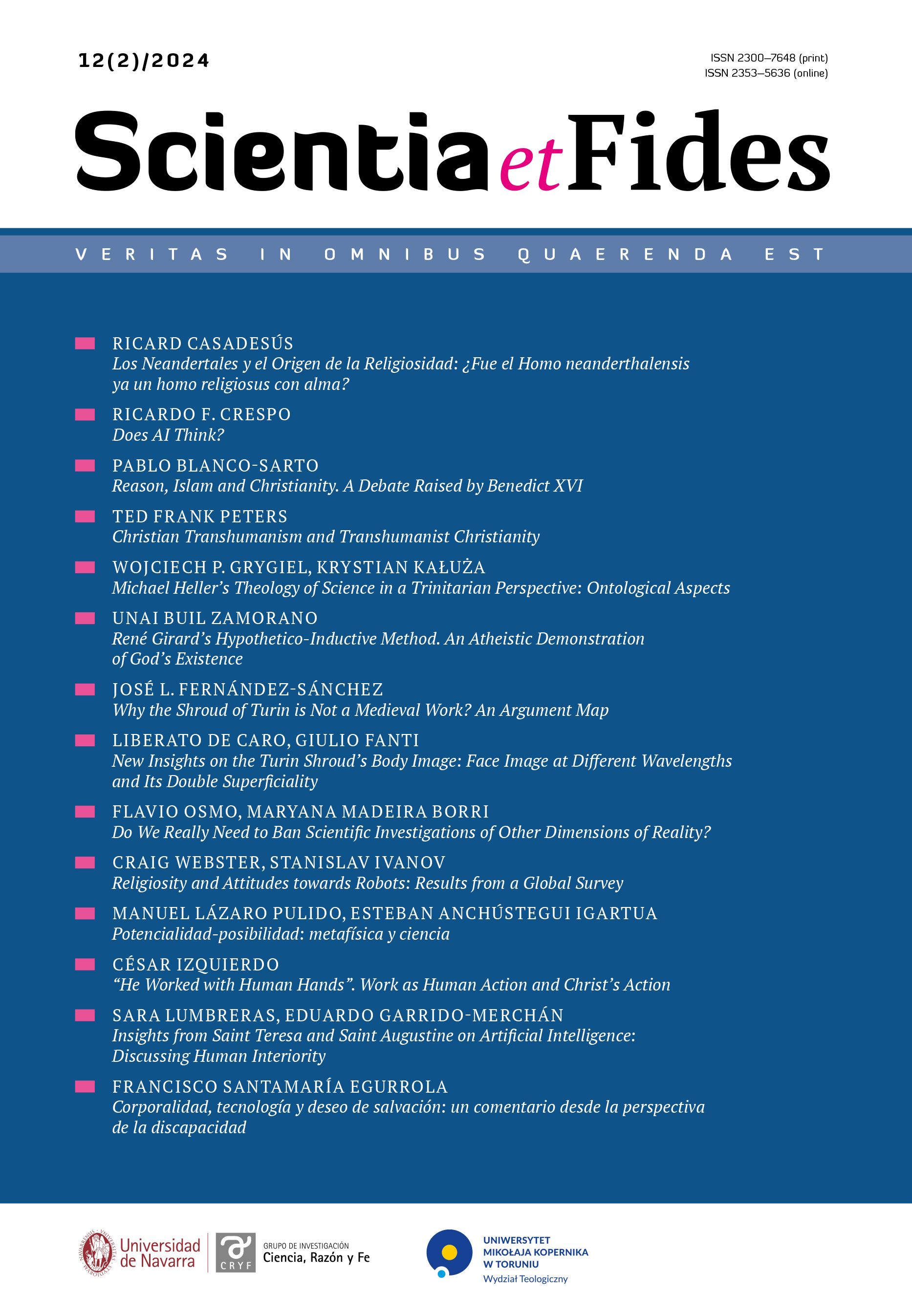Does AI Think?
DOI:
https://doi.org/10.12775/SetF.2024.014Słowa kluczowe
Aristotle on Knowledge, Modern and contemporary visions of knowledge, Philosophers expert on AI notion of knowledgeAbstrakt
This article raises a very relevant question today: “Does AI think?” To come up with an answer, it explores several conceptions of knowledge, from classical Aristotelian notions to modern philosophers’ takes on it. For Aristotle, knowledge starts with the senses, and, through epagoge and nous, it grows into an understanding of the nature of the thing known, which is something that does not happen with AI. Modern schools of thoughts are either rationalist or empiricist. For rationalists, knowledge is innate, while empiricists believe all knowledge comes from the senses. As Kant views it, knowledge is “built” on sensorial data with the use of theoretical reason categories. Based on these approaches, it is harder to claim that AI does not think by itself. The article also reviews current philosophers’ views on AI and AI thinking. Summing up, the answer to the initial question depends on the concept of knowledge adopted. As this article shares the classical notion of thinking, it concludes that AI does not think.
Bibliografia
Barnes, Jonathan. 1993. Aristotle Posterior Analytics, translated with a commentary by Jonathan Barnes. Oxford: Clarendon.
Blum, Paul Richard. 2010. “Michael Polanyi: Can the Mind be Represented by a Machine? Documents of the Discussion in 1949.” Polanyiana 201(1–2): 35–60.
Boden, Margaret. 2016. AI, its nature and future, Oxford: Oxford University Press.
Bunge, Mario. [1956] 1959. “Do Computers Think?” British Journal of the Philosophy of Science 7(26): 139–48, reprinted in Mario Bunge (1959) Metascientific Queries, 124–152, Springfield, Ill.: Charles C. Thomas.
Dreyfus, Hubert L. and Stuart E. 1986. Mind over Machine. The Power of Human Intuition and Expertise in the Era of Computer. New York: The Free Press.
Gilson, E. and T. Langan. 1963. A History of Philosophy, 3, Modern Philosophy. Descartes to Kant. New York: Random House.
Hintikka, Jaakko. 1980. “Aristotelian Induction.” Revue Internationale de Philosophie 34(133–134): 422–39.
Hintikka, Jaakko. 1992. “The concept of induction in the light of the interrogative approach to inquiry.” In J. Earman (ed.) Inference, explanation, and other frustrations: Essays in the philosophy of science. Berkeley, CA: University of California Press.
Hintikka, Jaakko. 2004. Analyses of Aristotle. Selected Papers 6. Hingham: Kluwer.
Jaki, Stanley L. 1969. Brain, Mind and Computers. New York: Herder and Herder.
Kant, Immanuel. [1787] 1999. Critique of Pure Reason, Translated and Edited by Paul Guyer and Allen Wood. Cambridge: Cambridge University Press.
Kenny, Anthony. 2006. The Rise of Modern Philosophy. Oxford: Clarendon Press.
Kenny, Anthony. 2007. Philosophy in the Modern World. Oxford: Clarendon Press.
Kohne, Jens. 2014. “Ontology, its Origins and its Meaning in Information Science.” In Philosophy, Computing and Information science, edited by Ruth Hagengruber, and Uwe Riss, 85–90. London: Pickering and Chatto. DOI: https://doi.org/10.4324/9781315653938
Landgrebe, Jobst and Barry Smith. 2023. Why Machines Will Never Rule the World. New York and London: Routledge.
Legg, Shane and Marcus Hutter. 2007. “A Collection of Definitions of Intelligence”, IDSIA-07-07 Technical Report. https://arxiv.org/abs/0706.3639, Accessed 22 February 2024.
McLear, C. 2020. “Kantian Conceptualism/Nonconceptualism.” In The Stanford Encyclopedia of Philosophy (Fall 2021 Edition), edited by Edward N. Zalta. https://plato.stanford.edu/archives/fall2021/entries/kant-conceptualism/.
Oberst, Michael. 2015. “Kant on Universals.” History of Philosophy Quarterly 32(4): 335–52.
Polanyi, Michael. 1952. “The Hypothesis of Cybernetics.” The British Journal for the Philosophy of Science 2(8): 312–315. https://www.journals.uchicago.edu/doi/10.1093/bjps/II.8.312.
Reeve, C.D.C. 2006. “Aristotle on the Virtues of Thought.” In The Blackwell Guide to Aristotle’s Nicomachean Ethics, edited by Richard Kraut, 199–217, Oxford: Oxford University Press.
Reeve, C.D.C. 1995. Practices of Reason. Aristotle’s Nicomachean Ethics. Oxford: Clarendon Press.
Sanchez Cañizares, J. 2022. “Posibilidades y límites de la inteligencia artificial.” Toledana 46(1): 233–50.
Turing, Alan M. 1950. “Computing Machinery and Intelligence”, Mind NS 59(236): 433–60. http://dx.doi.org/10.1093/mind/LIX.236.433.
Pobrania
Opublikowane
Jak cytować
Numer
Dział
Licencja
Prawa autorskie (c) 2024 Ricardo Crespo

Utwór dostępny jest na licencji Creative Commons Uznanie autorstwa – Bez utworów zależnych 4.0 Międzynarodowe.
CC BY ND 4.0. Posiadaczem prawa autorskiego (Licencjodawcą) jest Autor, który na mocy umowy licencyjnej udziela nieodpłatnie prawa do eksploatacji dzieła na polach wskazanych w umowie.
- Licencjodawca udziela Licencjobiorcy licencji niewyłącznej na korzystanie z Utworu/przedmiotu prawa pokrewnego w następujących polach eksploatacji: a) utrwalanie Utworu/przedmiotu prawa pokrewnego; b) reprodukowanie (zwielokrotnienie) Utworu/przedmiotu prawa pokrewnego drukiem i techniką cyfrową (e-book, audiobook); c) wprowadzania do obrotu egzemplarzy zwielokrotnionego Utworu/przedmiotu prawa pokrewnego; d) wprowadzenie Utworu/przedmiotu prawa pokrewnego do pamięci komputera; e) rozpowszechnianie utworu w wersji elektronicznej w formule open access na licencji Creative Commons (CC BY-ND 3.0) poprzez platformę cyfrową Wydawnictwa Naukowego UMK oraz repozytorium UMK.
- Korzystanie przez Licencjobiorcę z utrwalonego Utworu ww. polach nie jest ograniczone czasowo ilościowo i terytorialnie.
- Licencjodawca udziela Licencjobiorcy licencji do Utworu/przedmiotu prawa pokrewnego nieodpłatnie na czas nieokreślony
PEŁEN TEKST UMOWY LICENCYJNEJ >>
Statystyki
Liczba wyświetleń i pobrań: 727
Liczba cytowań: 0



